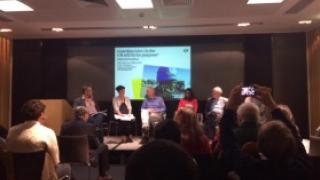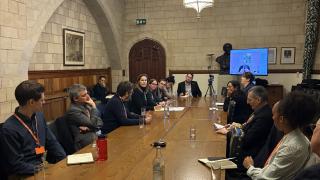
From a game that enables users to pinpoint what the UN has done for them, to a scathing critique of the UN's allegedly "big budget", the Guardian series - 'A world of problems: the United Nations at 70' - has supported UNA-UK in fostering public debate about the UN's successes and failures over the past 70 years.
The series culminated in a live debate on 14 October, which joined together UN experts and journalists to answer the fundamental question: "Is the UN fit for purpose?"
Chaired by Mark Rice-Oxley, the Guardian's head of special projects, panellists were: UNA-UK's Executive Director, Natalie Samarasinghe; Charles Petrie, a former senior UN official with over 20 years experience in conflict settings; the Guardian's Diplomatic Editor, Julian Borger; and Antony Loewenstein, a journalist, documentarian and author.
The debate opened with criticism of UN spending by journalist Harriet Grant, who questioned the discrepancy between "underfunded" humanitarian agencies and the UN's seemingly high budget of $500bn over 70 years. "Something clearly isn't working", insisted Grant.
In response, Natalie insisted that the UN's budget needs to be put into context. Echoing her rebuttal to a Guardian op ed last month, UNA-UK's director said that this figure - averaging $7bn a year - pales in comparison to the trillions of dollars spent annually on fossil fuel subsidies and military spending. "Brits spend more on takeaways", she added, arguing that we should not put a price on the work of the UN, which is a lifeline for millions of people around the world.
Discussion then moved on to the arguable "redundancy" of the UN Security Council, which has been unable to make a unified decision on the Syria crisis due to the repeated use of the veto by permanent members Russia and China. Julian Borger observed that past resolutions authorising military action have resulted in intervening powers going beyond their mandate: "the business of Libya hangs over the Security Council and poisons the Syria debate".
Nonetheless, noted Charles Petrie, who served, inter alia, as UN representative in Burundi, the Security Council has succeeded in taking swift action in some countries, especially where world powers have shared interests. Petrie cited the Burundi peace process as a notable UN "success story", and recognised that "if the UN disappeared tomorrow, there would be greater suffering in many areas, such as South Sudan".
While there was some disagreement about the UN's effectiveness, panellists agreed that a fairer, more inclusive process to select the UN Secretary-General could have a transformative impact on the Organisation. Natalie Samarasinghe explained that the current process - whereby a single candidate is effectively hand-picked by five countries behind closed doors - is geared to produce a UN leader who is beholden to the will of powerful states.
UNA-UK's 1 for 7 Billion campaign was cited as an important instrument in building momentum among states for an improved selection process. Natalie noted that while the campaign may seem to be pushing for "small reforms", such as a single, longer term of office for the UN chief, such changes would indicate that the UN was capable of reform and that UN leadership was more representative of the 193 member states.
Julian Borger ended the debate by pointing to the essential mission of the United Nations, saying that while it is flawed, it remains indispensable.
Podcast of the debate coming soon.






